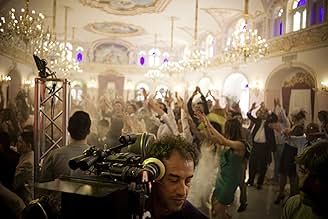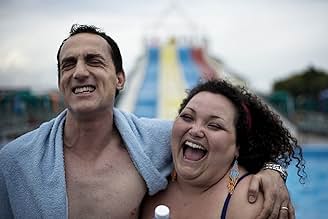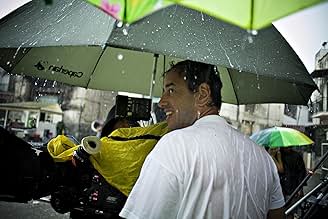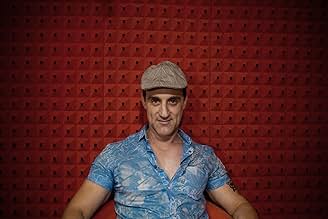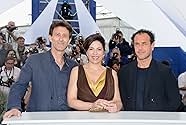IMDb रेटिंग
6.8/10
5.9 हज़ार
आपकी रेटिंग
अपनी भाषा में प्लॉट जोड़ेंLuciano is a charming fishmonger whose unexpected and sudden obsession with being a contestant on a reality show leads him down a rabbit hole of skewed perceptions and paranoia.Luciano is a charming fishmonger whose unexpected and sudden obsession with being a contestant on a reality show leads him down a rabbit hole of skewed perceptions and paranoia.Luciano is a charming fishmonger whose unexpected and sudden obsession with being a contestant on a reality show leads him down a rabbit hole of skewed perceptions and paranoia.
- पुरस्कार
- 12 जीत और कुल 19 नामांकन
फ़ीचर्ड समीक्षाएं
I learned of Matteo Garrone from his 2015 movie "Tale of Tales", an unusual spin on fairy tales. It turned out that he had earlier directed 2012's "Reality". The movie is part focus on Italy's working-class population, part indictment of reality TV's exploitation of "real people". The plot involves a fishmonger who gets chosen for a role on a reality show.
I should note that if you're only used to stereotypical Hollywood movies, then you'll want to avoid this one like the coronavirus. Much of the movie consists of long takes, focusing very much on the dialog. A good thing, if you ask me. I would like to see more movies about people and the modern world's impact on them.
I don't know if I would go so far as to call the movie a masterpiece, but it shows the Italy that exists beyond the fashion shows, bike races, etc. Worth seeing.
I should note that if you're only used to stereotypical Hollywood movies, then you'll want to avoid this one like the coronavirus. Much of the movie consists of long takes, focusing very much on the dialog. A good thing, if you ask me. I would like to see more movies about people and the modern world's impact on them.
I don't know if I would go so far as to call the movie a masterpiece, but it shows the Italy that exists beyond the fashion shows, bike races, etc. Worth seeing.
I saw this film as part of the Rotterdam film festival 2013 (IFFR), about someone pressured by his family to candidate himself for a Big Brother house. It all gets out of hand when he is not accepted initially but yet thinks to be on a sort of waiting list while being observed by the Big Brother team. He assumes being selected for a very special role in that TV show, and will be given a part later on when he proves to fit their criteria.
During the final Q&A the director said that the film is about dreaming to escape from reality and to loose one's identity. He describers the main character (Luciano) to be a victim of the system. Luciano desire to get into the Big Brother house comes from initial pressure by his family, though later on he himself gets a bit mad about it. He continues with rigor, in spite of protests from the same family that pressured him in the first place. The importance of the family cannot be stressed enough and has a crucial role in the story, something typical for Italy as stated by the director.
The story forming the basis for this scenario really happened to a brother of the director's wife. (By the way: He is fully recovered now. He has even re-opened his fish shop at the same spot in Naples.) And giving away his furniture to make a good impression on imaginary inspectors, was also real, even to the extent that his wife did not dare leaving the house in fear of finding it empty on return. Even the cricket that Luciano suspected to be full of camera's, appeared in reality too. The ending scenes seem a bit far fetched (I won't reveal details, for spoilers sake), but can be deemed all right if it really comes from the true story that was the basis of this film.
The director also said that the actors were taken from theater or cabaret (except one, a family member). Faces were an important criterion in the selection process. The roles they play and their appearances reflect a "normal" family from the region. That explains the overload of wrinkled people, and especially women looking like the stereotypical "mama" that we see in food commercials. Luckily, the main characters (Luciano and his wife) are not so bad looking, in contrast to their entourage.
All in all, the film is a nice product with many hilarious moments. It is a bit too long, in my opinion, particularly when you get easily annoyed by heavily gesturing Italians, talking with a waterfall of words (it looks that way for us, understanding no Italian) and overly dramatic movements. We won't consider this movie memorable, but it serves its purpose as family entertainment very well. Anyway, the audience seemed to enjoy themselves nevertheless. The venue (over 500 seats) was fully booked on a Sunday morning.
During the final Q&A the director said that the film is about dreaming to escape from reality and to loose one's identity. He describers the main character (Luciano) to be a victim of the system. Luciano desire to get into the Big Brother house comes from initial pressure by his family, though later on he himself gets a bit mad about it. He continues with rigor, in spite of protests from the same family that pressured him in the first place. The importance of the family cannot be stressed enough and has a crucial role in the story, something typical for Italy as stated by the director.
The story forming the basis for this scenario really happened to a brother of the director's wife. (By the way: He is fully recovered now. He has even re-opened his fish shop at the same spot in Naples.) And giving away his furniture to make a good impression on imaginary inspectors, was also real, even to the extent that his wife did not dare leaving the house in fear of finding it empty on return. Even the cricket that Luciano suspected to be full of camera's, appeared in reality too. The ending scenes seem a bit far fetched (I won't reveal details, for spoilers sake), but can be deemed all right if it really comes from the true story that was the basis of this film.
The director also said that the actors were taken from theater or cabaret (except one, a family member). Faces were an important criterion in the selection process. The roles they play and their appearances reflect a "normal" family from the region. That explains the overload of wrinkled people, and especially women looking like the stereotypical "mama" that we see in food commercials. Luckily, the main characters (Luciano and his wife) are not so bad looking, in contrast to their entourage.
All in all, the film is a nice product with many hilarious moments. It is a bit too long, in my opinion, particularly when you get easily annoyed by heavily gesturing Italians, talking with a waterfall of words (it looks that way for us, understanding no Italian) and overly dramatic movements. We won't consider this movie memorable, but it serves its purpose as family entertainment very well. Anyway, the audience seemed to enjoy themselves nevertheless. The venue (over 500 seats) was fully booked on a Sunday morning.
One of the things I have read more frequently about this movie is that, since it talks about the TV program "Big Brother", which in Italy has already reached the 12th season, it's supposed to be a decade late. Well: it's not, as the "Reality" mentioned in the title is obviously not the one of the TV-genre, but the actual one of nowadays Italy.
As Woody Allen wrote once, "life doesn't imitates art: imitates bad television". Following this line, the first scene is by far the more "fantastic" of the whole movie: we see an incredibly rich marriage ceremony, and we are not on TV or in any other fiction, but we are supposed to be in the real world - even if the settings and the outfits looks like a David LaChappelle picture. But later, when the guests go back to their homes, we see how theirs everyday "Reality" is made of poor dirty houses, impossibly crowded interiors, daily struggles and tricks to arrange a living. All places depicted completely lack any sign of awareness or responsible living in the world: newspapers don't exist, books are never read or shown, Internet is never searched – and receipts during commercial transactions are never issued. In this wasteland of culture and decency, feelings still grows. We can see that the main character still genuinely loves and cares for his wife and kids, and he could be called, in his own way, a good family man. But disaster suddenly happens when his set of values proves to be not enough to properly relate with the ghosts of fame and success.
This "Bigbrother" thing, when it was introduced in Italy had some cultural appeal, and for some months represented something worthy to talk about. But it has quickly evolved in a tire and sad repetition of the same situations, that seems to aim at a lower target every further year: and after more than 10 years of lowering, now it doesn't have audiences anymore, but victims. This movie will show you how one of those victims undergoes his own sacrifice. So, be prepared: it can't be anything else than a very sad story – highlighted anyhow by some great actor performances.
As Woody Allen wrote once, "life doesn't imitates art: imitates bad television". Following this line, the first scene is by far the more "fantastic" of the whole movie: we see an incredibly rich marriage ceremony, and we are not on TV or in any other fiction, but we are supposed to be in the real world - even if the settings and the outfits looks like a David LaChappelle picture. But later, when the guests go back to their homes, we see how theirs everyday "Reality" is made of poor dirty houses, impossibly crowded interiors, daily struggles and tricks to arrange a living. All places depicted completely lack any sign of awareness or responsible living in the world: newspapers don't exist, books are never read or shown, Internet is never searched – and receipts during commercial transactions are never issued. In this wasteland of culture and decency, feelings still grows. We can see that the main character still genuinely loves and cares for his wife and kids, and he could be called, in his own way, a good family man. But disaster suddenly happens when his set of values proves to be not enough to properly relate with the ghosts of fame and success.
This "Bigbrother" thing, when it was introduced in Italy had some cultural appeal, and for some months represented something worthy to talk about. But it has quickly evolved in a tire and sad repetition of the same situations, that seems to aim at a lower target every further year: and after more than 10 years of lowering, now it doesn't have audiences anymore, but victims. This movie will show you how one of those victims undergoes his own sacrifice. So, be prepared: it can't be anything else than a very sad story – highlighted anyhow by some great actor performances.
Garrone's magical movie opens with bows to two great scenes of Italian cinema: the ornate wedding carriage recalls the child's funeral procession from The Gold of Naples, and the helicopter-borne star of a reality show replays the helicopter ride of Jesus in La Dolce Vita. These images evoke Italy as the longest-running "society of the spectacle": Roman games; Renaissance princes and popes who conned everyone, as Machiavelli says; the splendors of the Counter-Reformation Church; and media mogul Silvio Berlusconi with the sun in his pocket-"il sole in tasca."
Luciano--fish monger, petty con artist, and pater familias--longs to be cast in a reality show called Big Brother. His quest becomes increasingly obsessive and fantasmagoric, and his extended family shifts from humorous support to escalating concern. Will his dream come true?
Aniello Arena in the part of Luciano is terrific and will capture your heart; he has a surprising and poignant story of his own, which you can check online for yourselves. Garrone is a master of production design, creating exuberant post-modern sets in which decaying Neapolitan palazzi mingle with malls and water slides. This movie is perhaps not for everyone-only for those prepared to enter a world that is theatrical, flamboyant, sentimental, and ironic--one that calls for a sense of humor and a big heart.
क्या आपको पता है
- ट्रिवियाAniello Arena, the lead actor, served nearly 30 years in prison for murder and was on parole when "Reality" was filmed.
- कनेक्शनFeatured in At the Movies: एपिसोड #10.21 (2013)
टॉप पसंद
रेटिंग देने के लिए साइन-इन करें और वैयक्तिकृत सुझावों के लिए वॉचलिस्ट करें
- How long is Reality?Alexa द्वारा संचालित
विवरण
बॉक्स ऑफ़िस
- US और कनाडा में सकल
- $72,577
- US और कनाडा में पहले सप्ताह में कुल कमाई
- $7,072
- 17 मार्च 2013
- दुनिया भर में सकल
- $33,50,996
- चलने की अवधि1 घंटा 56 मिनट
- रंग
- ध्वनि मिश्रण
- पक्ष अनुपात
- 2.39:1
इस पेज में योगदान दें
किसी बदलाव का सुझाव दें या अनुपलब्ध कॉन्टेंट जोड़ें



